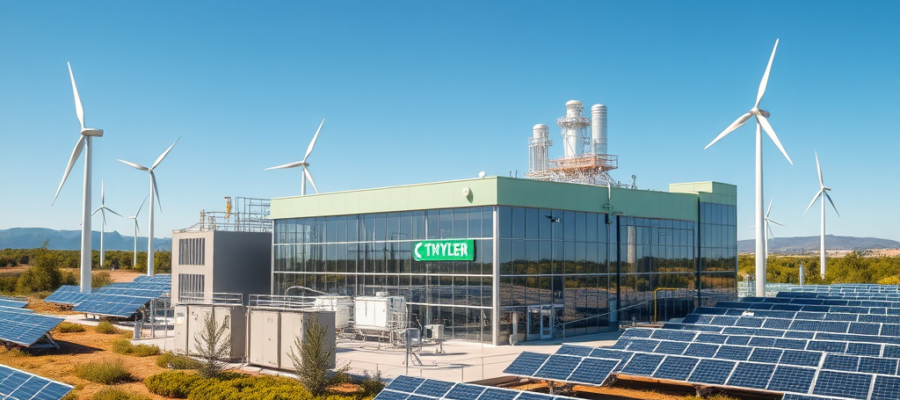Dubai is positioning itself as a global leader in green hydrogen technology, which presents numerous investment opportunities across various sectors. This article explores the potential for investors aiming to tap into Dubai’s ambitious green hydrogen initiatives, the infrastructural developments underway, and how stakeholders can benefit from the sustainable energy transition. With strategic government support and a commitment to reducing carbon emissions, Dubai is an ideal environment for businesses and individuals looking to invest in the future of clean energy. The potential for innovation in green hydrogen applications, coupled with robust governmental policies, lays the groundwork for promising financial returns in this sector.
Understanding Green Hydrogen and Its Importance

Green hydrogen is produced using renewable energy sources such as solar or wind. The process involves electrolysis, where electricity generated from renewable sources splits water into hydrogen and oxygen. Unlike traditional hydrogen production methods that often rely on fossil fuels, green hydrogen offers a much cleaner alternative. The importance of green hydrogen lies not only in its capacity to reduce greenhouse gas emissions but also in its versatility as an energy carrier. It can be used in various applications, including transportation, power generation, and industrial processes. As the world shifts toward cleaner energy solutions, the demand for green hydrogen is poised to increase significantly, providing lucrative opportunities for investors.
Government Initiatives Supporting Green Hydrogen

The Dubai government has set ambitious targets to integrate green hydrogen into its energy mix, demonstrating a robust commitment to sustainability. Key initiatives include significant investments in infrastructure, research and development, and incentives for private sector participation. Some of the notable government strategies include:
- Dubai Clean Energy Strategy 2050: Aiming to produce 75% of Dubai’s total power output from clean energy sources.
- National Hydrogen Strategy: Focusing on becoming a global hub for green hydrogen production and exports.
- Partnerships with Research Institutions: Collaborating with universities and tech companies to foster innovation.
- Funding and Incentives: Offering financial support to companies working on hydrogen technologies and infrastructure.
These initiatives are crucial in creating an ecosystem conducive for investment, supporting the transition to clean energy, and enhancing the overall attractiveness of Dubai as a destination for green hydrogen investments.
Investment Areas Within Green Hydrogen
Investors can explore various sectors within Dubai’s green hydrogen initiatives, which provide opportunities for growth and innovation. Key areas to consider include:
- Production Facilities: Establishing electrolysis plants to generate green hydrogen using renewable energy sources.
- Transport and Distribution: Developing the logistics infrastructure needed for hydrogen storage and transportation.
- End-User Applications: Investing in sectors that utilize green hydrogen, such as transportation (hydrogen fuel cell vehicles), power generation, and industrial processes.
- Research and Innovation: Supporting R&D initiatives that improve hydrogen production efficiency and reduce costs.
- Consultancy and Advisory Services: Providing expertise to guide companies in navigating the regulatory environment and technological landscape.
By capitalizing on these investment areas, stakeholders will be able to align themselves with Dubai’s goal of becoming a global leader in green hydrogen, thereby benefiting from the anticipated growth in this sector.
The transition to green hydrogen not only promises significant environmental benefits but also has a substantial economic impact. It creates jobs in the renewable energy sector and associated industries, stimulating local economies. Furthermore, as Dubai establishes itself as a hub for green hydrogen, it attracts foreign investment, fostering a climate of innovation and expansion. Businesses involved in green hydrogen can expect to contribute towards achieving sustainability goals while simultaneously realizing substantial economic returns. The ripple effect of these initiatives can enhance energy security, reduce dependence on fossil fuels, and position the UAE as a leader in the global energy market.
Conclusion
The investment landscape in Dubai’s green hydrogen initiatives is filled with potential, driven by proactive government policies, innovative technological applications, and a commitment to sustainability. As the world increasingly moves towards clean energy solutions, Dubai stands at the forefront of this transition, offering diverse opportunities for investors. By engaging with this sector, stakeholders can contribute to a sustainable future while enjoying substantial financial rewards. It is clear that green hydrogen represents not just an energy source but a key pillar in the future of global energy systems.
Frequently Asked Questions
1. What is green hydrogen?
Green hydrogen is hydrogen produced through renewable energy sources such as solar or wind, using an environmentally friendly process called electrolysis, which separates water into hydrogen and oxygen without emitting greenhouse gases.
2. Why is Dubai investing in green hydrogen?
Dubai is investing in green hydrogen to diversify its energy sources, achieve sustainability goals, and position itself as a global leader in the clean energy market.
3. What sectors can investors focus on within green hydrogen?
Investors can focus on areas such as production facilities, transport and distribution, end-user applications (like fuel cell vehicles), research and innovation, and consultancy services.
4. How does green hydrogen contribute to economic growth?
Green hydrogen contributes to economic growth by creating jobs, attracting investment, enhancing energy security, and fostering innovation in clean technologies.
5. What are the government incentives for investing in green hydrogen in Dubai?
The Dubai government offers various incentives, including funding opportunities, partnerships with research institutions, and regulatory support, to encourage investment in green hydrogen initiatives.
